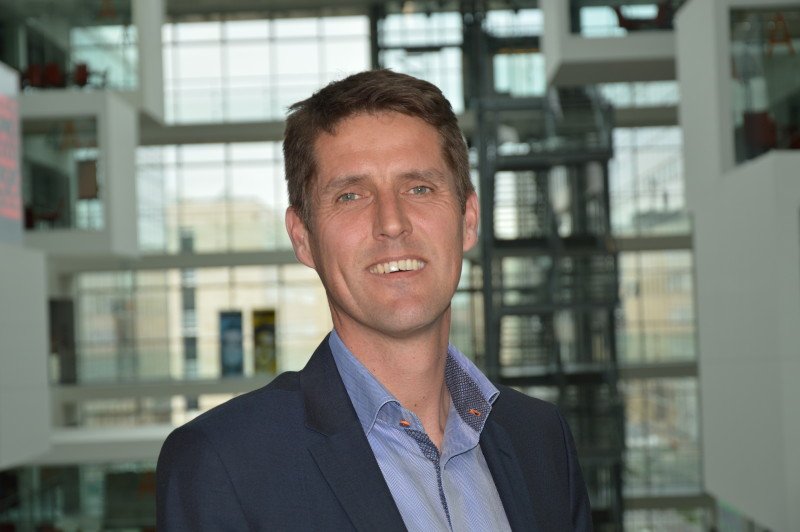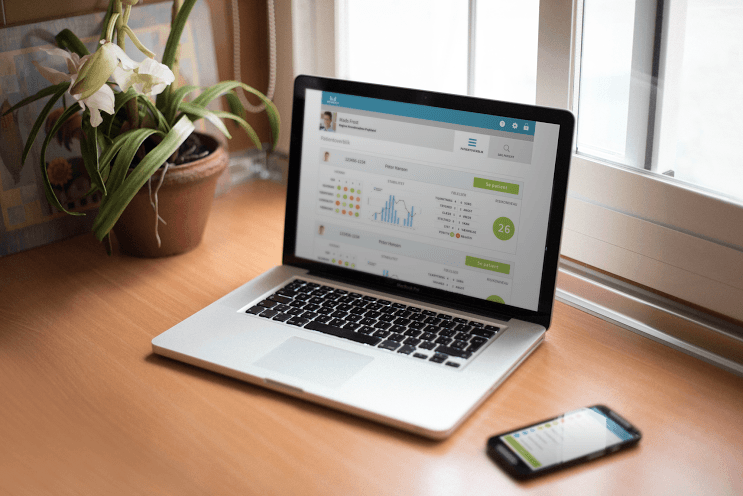Welcome to our weekly ‘Startup Spotlight‘ series, where we feature relatively under-the-radar but interesting tech startups in Europe.
This time, we're highlighting Monsenso, a Danish startup developing mobile health solutions targeted at healthcare providers with the aim of improving the treatment of mental illnesses.
Here’s a Q&A with Monsenso CEO Thomas Lethenborg and co-founder Jakob Bardram on how the company started, what makes its offering different from mood-tracking apps and insights on the tech scene in Copenhagen.
tech.eu: How would you describe Monsenso in a couple of sentences?
Thomas Lethenborg: Monsenso is an innovative technology company developing mobile health solutions for mental health. Our mission is to empower care providers, researchers and individuals to improve mental health and help society overcome the burden of mental illnesses.

When was Monsenso founded?
Jakob Bardram: Monsenso was founded in October 2013 by myself and Mads Frost as a spin-off from the IT University of Copenhagen. The company was based on the research done in the MONARCA Project, funded by the European Commission under the 7th Framework Program.
How is Monsenso different from other apps/services in this space (such as Aiden App, etc)?
JB: Although there are many mood trackers and smartphone apps available in the market, all these apps target patients and end-users who want to track their mood, stress, or anxiety over time. In contrast, Monsenso is an inclusive mHealth platform developed for clinics and hospitals that can be customised to support several mental diseases, such as bipolar disorder, depression, schizophrenia, and borderline.
Monsenso is much more than a “mental health app;” it is a comprehensive psychiatric solution that optimises the monitoring of patients, helps identify behavioral patterns and medication issues, and supports the efficient communication and information flow between patients and clinicians in real time.
The Monsenso platform targets clinics and their patients and so the Monsenso smartphone app cannot be used unless the end-user is a registered patient in a clinic that is using the system.
Where did the idea originally come from? Who are the co-founders?
JB: The MONARCA Project aimed to develop and validate solutions for multi-parametric, long-term monitoring of behavioral and physiological information relevant to bipolar disorder. It included the development of an appropriate platform and a set of services into an innovative system for management, treatment, and self-treatment of the illness. The project was hosted as part of the Pervasive Interaction Technology Laboratory (PIT Lab) at the ITU University of Copenhagen (ITU) where several research projects with academic and industrial partners have been undertaken over the years.

As part of the MONARCA project, a close collaboration was established between the researchers in the PIT Lab and the Department of Psychiatry at the University Hospital of Copenhagen (Rigshospitalet) represented by Professor Lars Vedel Kessing, MD & Ph.D. This Copenhagen-based alliance formed the basis for developing a unique sensing and treatment platform utilising semi-automatic data collection from smartphones used by patients.
During the project, the MONARCA system was designed and developed in close collaboration between the researchers, psychiatrists, and patients suffering from bipolar disorder. The system was subject to intensive clinical trials and ultimately went into a randomised clinical trial. More than 100 patients were enrolled in the clinical trials and used the system. The project was very successful and Dr. Frost was awarded a PhD degree, numerous publications in technical and clinical scientific conferences, and journals had been published. The MONARCA project became widely known both in Denmark and in Europe.
Furthermore, all patients and clinicians at the University Hospital requested to continue to use the system. MONSENSO was born to create a commercial set-up, and to continue to develop and support, operations of the MONARCA system.The company grew slowly mostly fueled by student programmers from the classes of Professor Bardram.
During 2014, a professional board was established consisting of people with significant experience in founding, building, and running biotechnology, pharmaceutical, and life science software companies. By the end of 2014, the first commercial version of the MONSENSO system was available, which also became the starting point for raising investment capital. In early 2015, significant capital was secured from a range of private investors, and Thomas Lethenborg joined the company as CEO and investor.
How much funding have you raised so far? Any plans to raise more?
JB: This information is confidential.
Can you talk about your business model? Or plans for monetisation?
TL: We are a partner-based company. We will work with partners globally to resell, set-up and potentially integrate our solution into their current offerings to the healthcare sector. We are currently entering into partnerships with companies in different countries.
The current pricing model is based on clinics paying an initial configuration fee and an annual fee depending on the number of patients and healthcare professionals. We plan to make adaptations to support national healthcare billing systems and procedures, as well as different language versions of the system.
How many users does Monsenso have currently?
TL: Our solution is currently used by more than 100 patients suffering from bipolar disorder at University Hospital of Copenhagen and from schizophrenia in Region Northern Denmark. Additionally, we are implementing the solution for borderline personality disorders in Region South Denmark and for depression at University Hospital of Copenhagen.
We are also negotiating with the first international customer contracts and therefore expect a significant increase in number of users over the next months – both domestically and internationally.
How big is the Monsenso team at the moment? Where does the company have offices?
TL: At the moment, Monsenso has 11 employees. Our office is still located in Copenhagen, Denmark.
How would you characterize the startup/tech ecosystem in Copenhagen? Can you name a couple of advantages and disadvantages of building a startup out of the city?
TL: Danish startups have a range of government-supported programs such as the previously mentioned Market Development Fund, the Danish Growth Fund and the Innovation Fund. The Innovation Fund is supporting research projects broadly – including Industrial PhD programs. They have specifically earmarked a pool of funding in 2015/16 to the research in the mental health space.
In May 2015, Denmark was named the best country for mHealth companies by a research done by Research2Guidance. Reasons include a high level of digitisation in public sector and healthcare, strong penetration of Internet and smartphones as well as high level of Electronic Health Record adaptions. A number of organizations are encouraging innovative collaboration and public-private-partnerships including Health Care Denmark and regional innovation centers such as MedTech Innovation, WelfareTech and the Telepsychiatric Center of Region South Denmark.
JB: Denmark consistently ranks among top performers regarding digitisation of the public sector as a whole. This impacts the ease of setting up a business in Denmark. It literally takes one day to set up a business and work permits for foreign employees can be issued in as little as five weeks. Corporate taxes are reasonable compared to the rest of the EU countries. While income tax levels for Danes are rather high, income tax for high-skilled foreign experts on a time-limited contract is very attractive, making it easier to attract the right competences.
Moreover, we are the best non-native English speakers in the world, which obviously attracts lots of highly educated international talent, in addition to the existing pool of highly skilled Danish workforce. Salary levels, income tax levels and cost of living in Denmark (compared to other EU countries) are quite high. Nevertheless, that is compensated by the availability of skilled employees and high productivity.
What's the company's plan for the next 12 months?
TL: We are currently in negotiations with different customers in Denmark, Norway, Sweden, Ireland, Canada, and Spain. We already have a representative in India and we are currently negotiating onboarding of partners in Norway, US, Germany, UK and Mexico. The plan for the upcoming twelve months is to take our platform and our experiences from bipolar, depression, schizophrenia and borderline personality disorder internationally. Simultaneously, we will expand use cases to cover all relevant mental and behavioral disorder categories.
Our product development roadmap is ambitious and includes a range of functionalities requested by current and future clients. Our research efforts will focus in the advanced data analysis area with the aim to understand collected behavioral health data better and be able to predict risk levels and future conditions of patients to enable early intervention and preventive care.
While our primary geographic focus will be Europe, we are open to partnerships worldwide. Through current partnership dialogues and our participation in international conferences, we do see a demand and concrete opportunities for the solution across all regions.
The interview has been edited and condensed.
Read more from this series:
- Romania's iMedicare wants to help pharmacies better help their patients
- Meet Toothpick, the UK startup that wants to take the pain out of booking a dentist
- Italian hardware startup Solenica wants to bring more sunshine into your life
Images courtesy of Monsenso.



Would you like to write the first comment?
Login to post comments